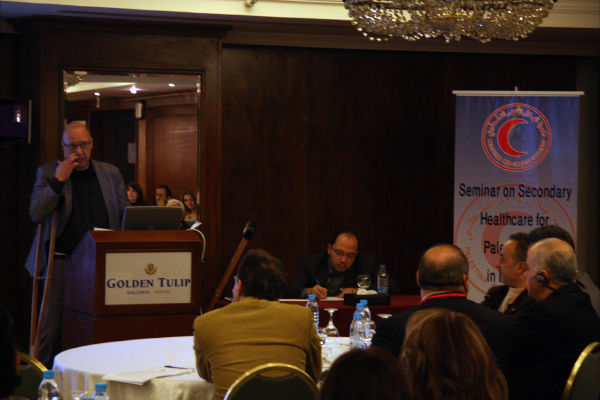
(Lebanon- 6/2/2012): PRCS branch in Lebanon held a seminar on “Secondary Health Care for Palestinian Refugees in Lebanon” with the participation of the Lebanese Red Cross, IFRC, UNRWA and representatives from the Palestinian Embassy in Lebanon, the Palestinian Health Insurance Fund and NGOs working with Palestinians.
The Seminar was facilitated by Dr. Samer Shihadeh, Head of Project Unit at PRCS/Lebanon.
In his speech, Dr. Mohammad Othman, Secretary General of PRCS Lebanon, welcomed participants and commended the roles played by them. On behalf of PRCS, he thanked all PRCS partners and sponsors in general and PRCS/Lebanon in particular.
Salvatore Lombardo, UNRWA Director General in Lebanon, commended the unique ties between UNRWA and PRCS/Lebanon. He lauded the role played by PRCS in providing health services to Palestinian refugees alongside UNRWA. He hoped that these ties will be stronger in the future.
Co-author Julie Davidson who is writing a book entitled “Poverty in Lebanon” together with Rupin Das, described in brief the tragic conditions of some Palestinian communities and camps in Lebanon when it comes to the infrastructure and unhealthy houses and the effect thereof on health conditions of Palestinian refugees in Lebanon.
Gerard Jonkman, Representative of the Dutch Red Cross Society in Lebanon, said that PRCS hospitals in Lebanon provide services that are quite capable of competing with similar private hospitals in Lebanon contracted by UNRWA.
Dr. Mouna Othman, Head of the Health Section at UNRWA in Lebanon who is also in charge of both Primary and Secondary Health Care at UNRWA, presented the results of a study prepared by UNRWA regarding patients referred to PRCS hospitals. The study clearly showed an increase in the number of patients referred in 2011 compared with 2009 and 2010, which indicates that PRCS/Lebanon is working hard to improve the quality of services provided to patients.
Dr. Ziyad Mansour, who worked as a consultant and prepared several studies for UNRWA, PRCS and the Lebanese Ministry of Health, spoke about the health system in Lebanon which he described as “still very complicated. There is no clear health policy or system that governs all health institutions in Lebanon. Moreover, the Lebanese people do not benefit from any health insurance system. Several studies have already tackled the health conditions of Palestinians. Now is the time to take effective steps to improve the Palestinian health system”, he said.
Dr. Salah Al Ahmad, Head of Medical Services at PRCSLebanon, gave a brief presentation on PRCS services in Lebanon in general, with a special focus on secondary health care services provided by the five PRCS hospitals in Lebanon to Palestinian communities. He touched on the important role played by PRCS hospitals which are located either inside or near Palestinian refugee camps and which have proved in the most difficult moments that they are capable of providing services to all those in need regardless of their affiliations or nationalities. Dr. Al Ahmad also presented the results of a study prepared by PRCS on patient satisfaction regarding hospital services provided by PRCS, and which showed a satisfaction rate similar to the one presented by UNRWA, which indicates that this rate is quite accurate.
At the end of the seminar, Dr. Riyad Mir’I, Coordinator of the Quality Program at PRCS hospitals in Lebanon, made a presentation in which he affirmed that PRCS is already applying a large number of quality standards agreed upon with UNRWA. “The main difficulty concerns those standards that will require large sums to be implemented -compared to the fees paid by UNRWA- once the program ends”, he said.